Check out a list of profound spiritual lessons by various topics like mindfulness, gratitude, love, faith, etc. to guide your life’s journey!
I used to think about spirituality as a distant concept, something reserved for the mystics and the monks. Raised in a traditional, conservative Christian environment, my understanding of spirituality was limited to church sermons and Sunday school lessons. However, as I grew older and ventured beyond my familiar world, I came across people from diverse cultures and faiths, each with their own unique practices and beliefs.
It was through these encounters and my own exploration that I began to appreciate the complexity and beauty of spirituality. I realized that it’s not about adhering to a specific dogma or following a rigid set of rules. Instead, it’s about cultivating a deep connection with oneself and the world around us.
After a long time of exposure, research, and reflection, I have come up with a list of spiritual lessons – guiding principles that allow one to transform life from the inside out, navigate challenges, and attain lasting peace.
Spiritual Lessons for Beginners
Understanding that spirituality is a personal journey
This is the first and foremost among all spiritual lessons. For example, one person might find solace in daily meditation and prayer, while another might connect with their spiritual side through nature walks or creative expression. Some may prefer organized religious practices, while others might explore alternative paths like yoga or mindfulness.
After all, the goal of spirituality is to facilitate self-discovery and a deeper understanding of one’s place in the world. It’s about cultivating a sense of inner peace, compassion, and connection with something greater than oneself, whatever that may mean to you. Hence, there is no single “right” way.
There is no other spiritual teacher than your own soul.
Swami Vivekananda
Staying present in the moment
A fundamental principle in many spiritual traditions, it is about focusing one’s attention on the here and now, rather than dwelling on the past or worrying about the future. Only by being present may you truly savor the joys and beauty of life. You will notice the little things that you might otherwise miss, like the warmth of the sun on your skin, the sound of birds chirping, or the taste of your favorite food. At the same time, you will also become more attentive to people’s needs and feelings, communicate more effectively, and improve productivity in every aspect of life.
How to practice being present:
- Mindfulness meditation: This involves focusing your attention on your breath or a specific object or sound. It’s a great way to train your mind to stay present.
- Grounding techniques: These techniques help you to connect with your physical body and the present moment. For example, you may try focusing on your senses, such as the feeling of your feet on the ground or the smell of the air around you.
- Single-tasking: Instead of trying to multitask, doing only one thing at a time will help you become more present and engaged in the task at hand.
- Taking breaks: When you’re feeling overwhelmed, take a short break to rest and recharge – so that you may come back to work with a fresh perspective.
Do not worry about tomorrow, for tomorrow will worry about itself.
Matthew 6:34
Observing without judgment
We should not be too hasty in terms of labeling our thoughts and experiences as good or bad, right or wrong. Instead, it’s much better to simply acknowledge them for what they are, without getting caught up in emotional reactions. Over time, this practice not only fosters self-understanding – but also contributes to more harmonious connections.
Journaling is a great way to cultivate such awareness. As you jot down what is in your mind, you will gradually learn to view life from a different, neutral perspective. Whenever you notice a judgmental thought, ask yourself, “Is this thought really true?” or “Is it helpful?”
The ability to observe without evaluating is the highest form of intelligence.
Jiddu Krishnamurti

Spiritual lessons
Practicing daily stillness
A daily practice of stillness or meditation, even for a brief period, can profoundly impact one’s spiritual journey. It provides a sanctuary where you may connect with your inner self, interpret your emotions, and better manage stress.
Find a peaceful place where you won’t be disturbed, and feel free to sit or lie down as you wish. Begin with 5 minutes a day and gradually increase the duration as you become more comfortable.
In the stillness of the heart, the truth speaks most clearly.
Rumi
Acknowledging the interconnection of all living beings
We are part of a larger whole, rather than isolated individuals. Understanding that everything is connected is the first step to cultivating empathy and compassion towards all living beings.
As we recognize that we are part of the same fabric of existence, we become more mindful of our actions and their impact on others. Not to mention, it also contributes to better awareness of the delicate balance of ecosystems and the importance of sustainable practices.
We are all part of the One Spirit.
Yogananda
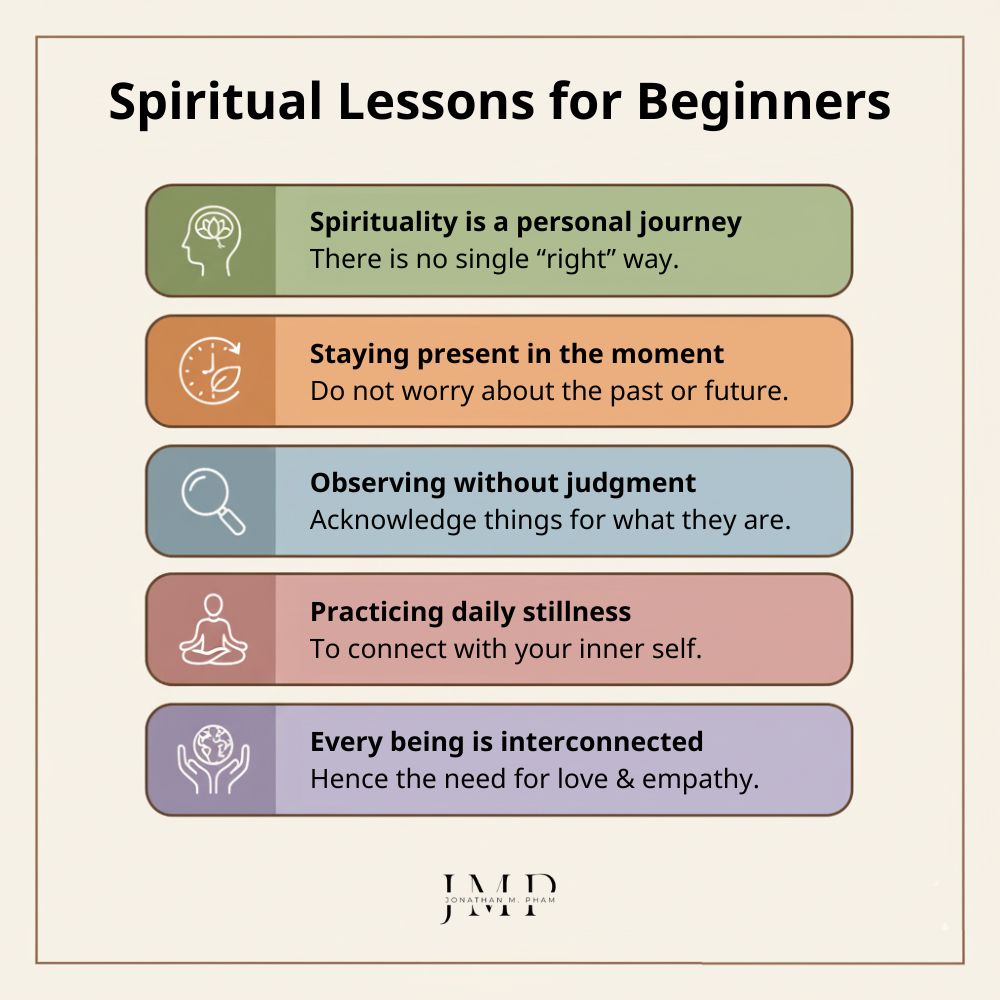
Spiritual Lessons about Discovery & Purpose
Seeking to determine your unique calling
First, we need to recognize our unique talents and skills. These can be anything from artistic abilities to leadership qualities, problem-solving skills, or a knack for connecting with others. Take some time for introspection, journaling, or talking with trusted friends to uncover your passions and what truly excites you.
Once we are aware of our strengths, we can identify how they benefit the world around us. Think about how to leverage our skills in a career, volunteering the time, or sharing our knowledge with others.
Examples:
- Artistic talent: Someone with a gift for painting might use their art to express emotions, inspire others, or raise awareness for social causes.
- Leadership skills: A natural leader could organize community events, mentor young people, or start a non-profit organization.
- Problem-solving abilities: Someone with a knack for problem-solving could develop innovative solutions to environmental issues or create new technologies.
- Empathy and compassion: A compassionate person could volunteer at a homeless shelter, counsel those in need, provide coaching & mentoring, or advocate for social justice.
The unexamined life is not worth living.
Socrates
Exploring your inner self
Regardless of personal beliefs about the nature of the self (whether it is static or dynamic), we are all encouraged to delve into the depths of our being. Frequent self-exploration is crucial to identifying areas that need improvement, making more conscious choices, and cultivating a sense of connection to everyone and everything.
Here are some basic probing questions for self-reflection:
- “What are my core values?”
- “What motivates me?”, and
- “What are my fears and hopes?”
Aside from activities like journaling and meditation, one may also consider seeking help from an experienced therapist/ coach/ counselor – or engaging in practices such as yoga to foster mind-body connection.
Know thyself.
Socrates
Accepting that purpose may evolve over time
Our purpose is not a fixed destination but a continuous journey. As we grow and evolve, so too does the awareness of our unique calling. Being open to change allows us to adapt to new circumstances and discover new opportunities.
Examples:
- Career paths: A person may start their career with a specific goal in mind, only to discover a new passion or talent that leads them in a different direction.
- Relationships: As we mature, we may need to redefine who we connect with to align with our evolving needs.
- Spiritual beliefs: It is perfectly normal for one to encounter new ideas and perspectives that challenge (or at least require them to acquire a different perspective) their existing beliefs over time.
After all, the journey itself is as important as the destination. It’s in the process of self-discovery and growth that we find true meaning in life.
When I was a child, I spoke like a child, I thought like a child, I reasoned like a child. When I became a man, I put away childish things.
1 Corinthians 13:11

Spiritual lessons
Read more: Goal Obsession – The Ultimate Flaw that Demolishes Success
Knowing that moments of confusion are often part of the discovery process
Life is full of uncertainties. As we navigate these twists and turns, our intuition plays a crucial role in guiding us toward our true path. Hence, just pay attention to your gut feelings, trust your instincts, and act flexibly instead of being obsessed with finding definite answers.
Feeling confused is also a sign that you are potentially on the brink of a breakthrough. What you need to do at that time is to embrace the chaos and trust the process. Take your time, be patient, and allow things to unfold naturally. Rushing through life will only lead to missed opportunities and unnecessary stress.
Nature does not hurry, yet everything is accomplished.
Lao Tzu
Realizing that the pursuit of purpose often involves serving others
True fulfillment comes not from self-seeking, but from giving to others. As mentioned, we are all part of a larger whole, and our actions have a ripple effect on others. Serving people without expecting anything in return is key to bringing about a deep sense of peace and satisfaction. On the other hand, when we give, we receive in return, often in unexpected ways.
Examples of service to others:
- Volunteer work.
- Mentorship & knowledge sharing.
- Acts of kindness (e.g. helping a neighbor, donating to charity, or simply offering a listening ear to someone in trouble).
- etc.
The first step is to identify your passions. What are you passionate about? What skills or talents do you have that you can share with others? Choose a cause that resonates with your values and interests. Start small and gradually increase your involvement in community activities.
It is more blessed to give than to receive.
Act 20:35
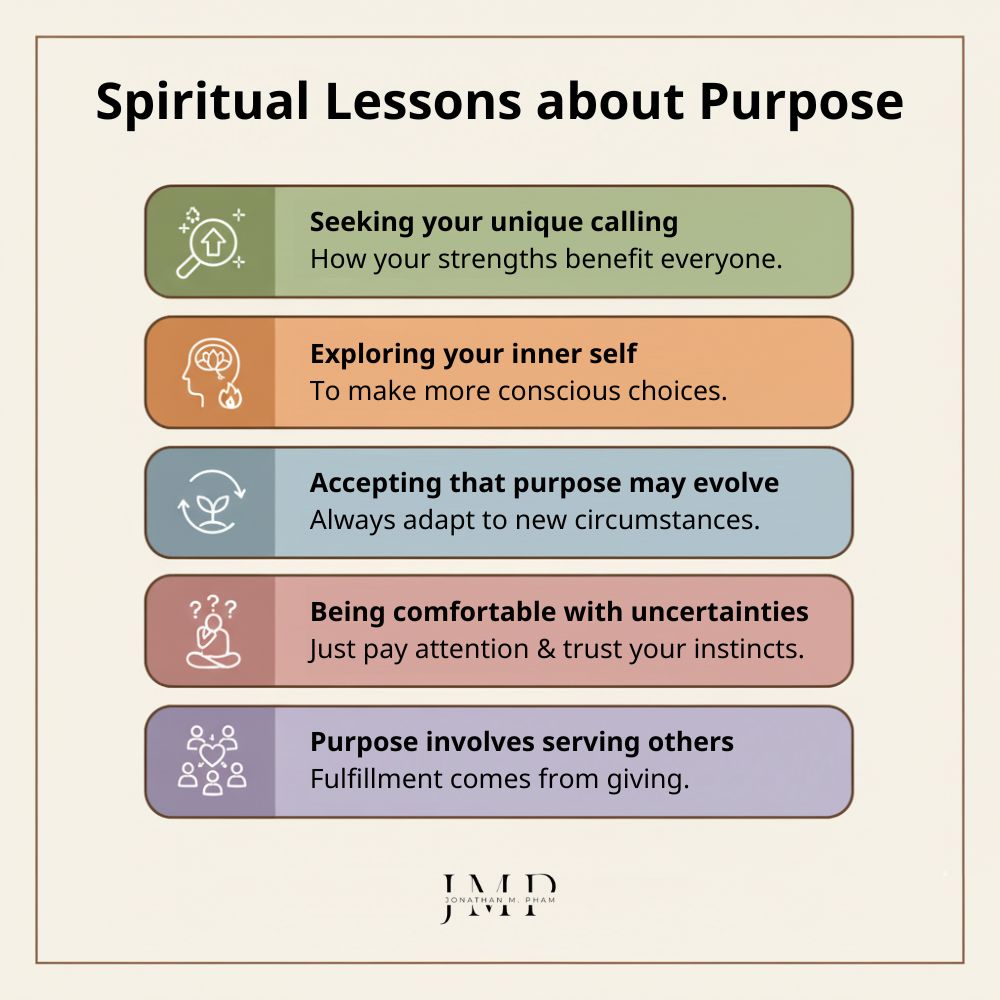
Spiritual Lessons about Love & Acceptance
Learning to love yourself unconditionally
Our mistakes, failures, or shortcomings should not compromise our sense of inherent worth. For example, if you make a mistake at work, instead of berating yourself, you should acknowledge the mistake, learn from it, and still love yourself as a person.
When you truly love yourself, you are less likely to seek validation from people to fill a void within yourself. This allows you to give love freely and unconditionally to those around you.
If you have a friend going through a tough time, you should be able to offer them empathetic support without judgment or ulterior motives.
Loving yourself means setting healthy boundaries in relationships to protect your well-being. At the same time, it also requires activities that nourish your mind, body, and soul, such as spending time in nature or engaging in hobbies you enjoy.
Self-love is the foundation for your capacity to love the other person.
Thich Nhat Hanh
Accepting people for who they are
Each person is unique, with their own thoughts, feelings, and experiences. Accepting others means acknowledging and respecting these differences. For example, if a friend has a different political viewpoint, instead of dismissing them, it’s much more constructive to seek to interpret their perspective and engage in respectful dialogue.
When we try to change others to fit our expectations, we create resentment and strain relationships. On the other hand, accepting people as they are makes it possible to foster genuine connections, reduce conflicts, cultivate compassion, and bring about a sense of freedom. Even if we disagree with someone, we should be mindful of our shared humanity and treat them with respect and kindness.
Be kind, for everyone you meet is fighting a hard battle.
Ian Maclaren
Understanding that forgiveness is a gift to yourself
Holding onto grudges is like carrying a heavy burden. Forgiveness allows us to release these burdens, freeing ourselves from emotional pain and suffering. It doesn’t mean condoning the hurtful behavior or forgetting what happened. Rather, it simply means releasing the negative emotions associated with the event and choosing to move forward. By doing so, you are giving yourself the greatest gift of all: the gift of freedom.
To forgive is to set a prisoner free and discover that the prisoner was you.
Lewis B. Smedes

Spiritual lessons
Practicing compassion, even toward those who challenge you
Human beings possess the unique capacity to choose their response, instead of succumbing to external circumstances. When faced with a difficult conversation (e.g. a negative co-worker, trolling online, etc.), we have the choice to approach the situation with empathy and a willingness to listen to the other person’s perspective, even if we disagree with it.
Most of the time, our impulsive reactions are driven by fear, which is ultimately an illusion that can be overcome through understanding and kindness.
If anyone slaps you on the right cheek, turn to them the other cheek also. And if anyone wants to sue you and take your shirt, hand over your coat as well. If anyone forces you to go one mile, go with them two miles. Give to the one who asks you, and do not turn away from the one who wants to borrow from you.
Matthew 5:39-42
Recognizing that love is abundant
Often, we think about love from a scarcity mindset, believing that there’s only a limited amount of love to go around. This is the cause of feelings such as jealousy, possessiveness, and fear of loss.
Love is not a tangible thing that can be measured or quantified. It’s an energy that expands and grows the more it’s shared. Giving and receiving love without fear of running out is key to forming deeper connections and cultivating long-lasting happiness.
Love only grows by sharing. You can only have more for yourself by giving it away to others.
Brian Tracy
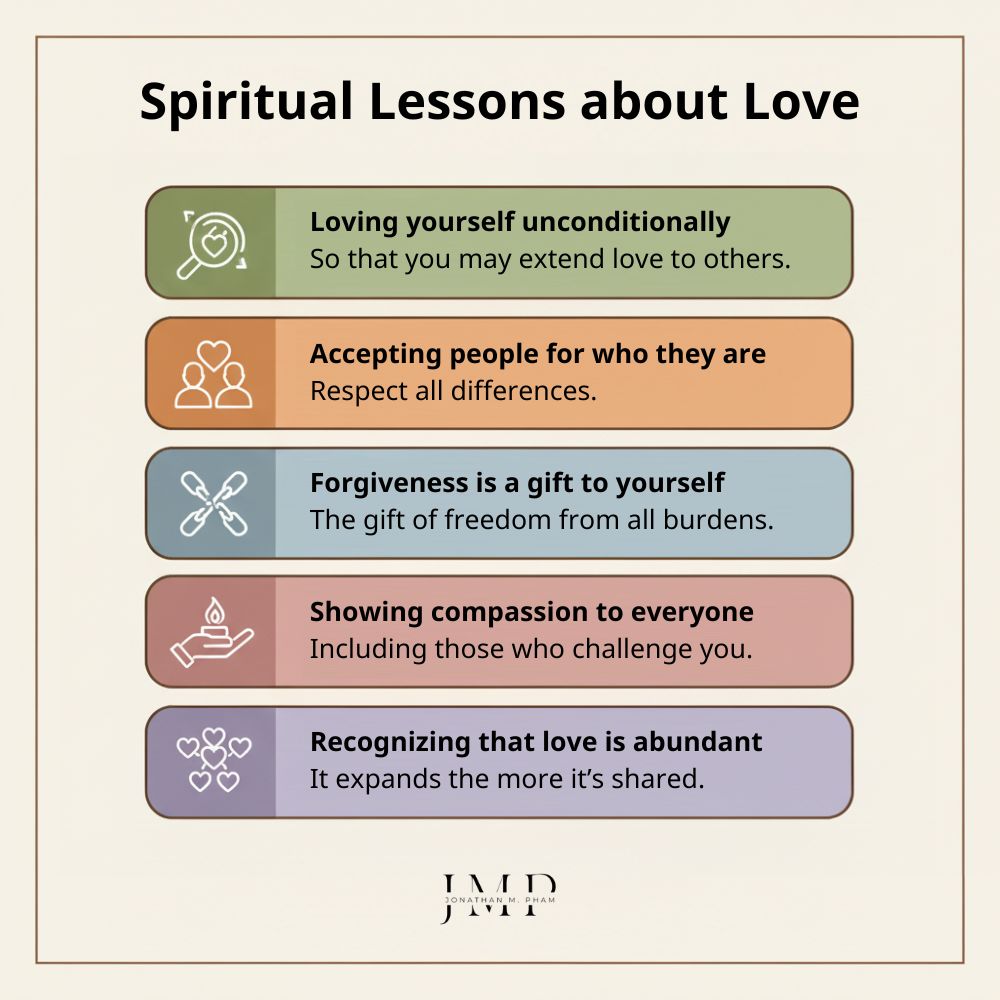
Spiritual Lessons about Faith & Trust
Surrendering the need to control everything
We are all encouraged to let go of the need to control every aspect of our lives and instead trust in the natural flow of existence. It’s about surrendering to a higher power, whether that be a divine force, the universe, or simply the interconnectedness of all things. Even when things seem chaotic or uncertain, there is still an underlying order and purpose to life. Hence, we need to believe that everything unfolds as it should – and that we are guided by a higher intelligence.
Examples:
- Job searching: Instead of fixating on a specific job and controlling every aspect of the application process, have faith that the right opportunity will come along at the right time.
- Relationships: Rather than trying to force a relationship to fit a certain mold, remind yourself about the possibility that the connection will deepen naturally and authentically as conditions change.
- Health: Instead of obsessing over every symptom and fearing the worst, trust that your body has the innate ability to heal and restore itself.
Embracing the flow helps us navigate challenges with greater ease, as we become less likely to cling to rigid expectations. In addition, it also cultivates a sense of spiritual connection and a deeper understanding of our place in the universe.
When you argue with reality, you lose, but only 100% of the time.
Byron Katie
Understanding that challenges are opportunities for growth
Suffering, rather than negative experiences to avoid, should be viewed as a catalyst for positive change. After all, challenges are stepping stones on the path of personal development; they help reveal hidden strengths, weaknesses, and blind spots, forcing us to confront and overcome them. Instead of dwelling on the source of suffering, the focus should be on extracting valuable lessons from the experience.
Some people may believe that suffering is a result of past actions/ karmas – or a test from a higher power. Others may see it as a necessary part of the human experience. Regardless of specific beliefs, the core idea is that suffering serves a purpose beyond immediate discomfort.
Examples:
- Job loss: While painful, job loss may lead to new opportunities, career reinvention, and the acquisition of valuable skills like resilience and adaptability.
- Health challenges: Experiencing illness can motivate individuals to adopt healthier habits and appreciate the gift of good health.
- Relationship difficulties: Relationship challenges can teach us valuable lessons about communication, compromise, and self-love.
What doesn’t kill you makes you stronger.
Friedrich Nietzsche
Believing that the universe or a higher power is always supporting you
It doesn’t matter if you are a Christian who believes in an omnipotent force beyond this physical world or a Buddhist seeking enlightenment inside. All spiritual traditions speak to the existence of a higher power that is always by our side when we are in need of it. All that matters is whether we are aware of it or not.
Faith provides an amazing source of comfort, guidance, and support, particularly during challenging times. Even when things don’t go as planned, trust in the unfolding of life is crucial to cultivating a sense of peace and acceptance – with which one may better tap into a deeper source of strength, wisdom, and love.
Help is always given to those who ask for it.
J. K. Rowling

Spiritual lessons
Recognizing that faith requires action, not just belief
True faith is not merely a passive belief; rather, it involves an active engagement with life and a commitment to living in accordance with one’s values and beliefs. For instance, it does no good if one proclaims belief in the inherent worth and dignity of all people and yet spends little time volunteering for the community. Only with concrete actions may one deepen their spiritual life, demonstrate their convictions, and make a positive impact on the world.
As a side note, it’s worth reminding that sometimes, faith requires us to take extreme actions and make significant life changes, such as quitting a job to pursue a passion project or moving to a new country.
Show me your faith without your works, and I will show you my faith by my works.
James 2:18
Trusting in divine timing
Life events unfold according to a grander scheme; hence, patience and trust are essential virtues. Many times, things occur at an optimal time – when we truly need them, not necessarily when we desire them. While this may be a challenging concept to grasp, embracing it is essential to foster greater peace and acceptance.
Examples:
- Career changes: A job loss or a career change might seem difficult at the time, but it could lead to a more fulfilling and meaningful career path in the long run.
- Relationship challenges: A breakup or a difficult relationship might be painful, but it could ultimately lead to a healthier and happier relationship in the future.
- Health issues: A health challenge might force us to slow down, reevaluate our priorities, and appreciate the gift of good health.
Everything happens for a reason, and sometimes, the best things take time!
Patience is bitter, but its fruit is sweet.
Jean-Jacques Rousseau
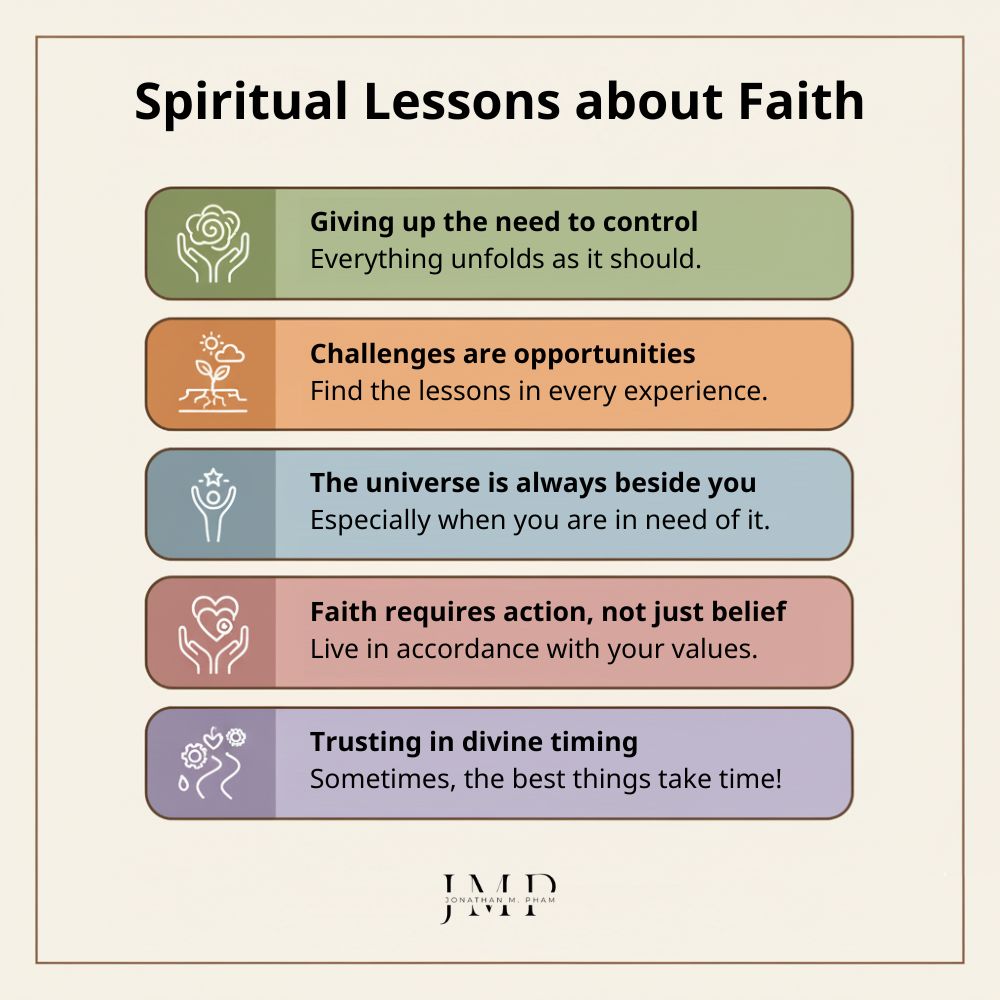
Spiritual Lessons about Gratitude & Mindfulness
Focusing on what you have, not what you lack
We should remind ourselves to actively acknowledge all positive aspects in life, no matter how small they may seem. Instead of constantly thinking about what we don’t have, it is better to shift attention to the things we do – our health, loved ones, a roof over our heads, food on the table, or even simple pleasures like a beautiful sunset or a good book.
Being obsessed with what we lack breeds a sense of dissatisfaction and discontent – which is the cause of unhappiness and stress. By contrast, being grateful for what we have allows us to appreciate our blessings and cultivate a sense of contentment.
Some examples of how to apply this lesson:
- “I don’t have enough money to buy that new car.” => “I’m grateful for the reliable car I have that gets me to work every day.”
- “I wish I had a bigger house.” => “I’m thankful for the cozy home I share with my family.”
- “I don’t have a partner.” => “I’m grateful for the love and support of my friends and family.”
I cannot say this too strongly: Do not compare yourselves to others. Be true to who you are, and continue to learn with all your might.
Daisaku Ikeda
Demonstrating childlike curiosity
Children are naturally curious and constantly ask “why.” The same practice, when applied by adults, can open up new perspectives and lead to deeper clarity. Therefore, don’t be afraid to ask “why” about the things you encounter in your life, even if they seem mundane.
Example: Instead of simply accepting that the sky is blue, ask yourself, “Why is the sky blue?” This could lead to research and a deeper appreciation for the science behind it.
Additionally, play is an essential part of childhood development. As adults, we can incorporate play into our lives by engaging in hobbies and creative pursuits (e.g. painting, gardening, playing a musical instrument), or joining a club or group that shares our interests.
The important thing is not to stop questioning. Curiosity has its own reason for existence.
Albert Einstein
Practicing mindful eating
Mindful eating is a practice that involves paying full attention to the experience of eating. It’s more than just consuming food; it’s about connecting with the food, appreciating its taste, texture, and aroma, and being grateful for the nourishment it provides.
Benefits:
- Sensory awareness: By paying attention to the sensory experience of eating, you may better appreciate the intricate details of your food. This heightened awareness can lead to a sense of gratitude for the flavors, textures, and aromas that nourish your body.
- Gratitude for the source: Whether it’s a farmer who grew it, a cook who prepared it, or the earth that provided the nutrients, expressing gratitude for these sources can deepen your appreciation for the world.
- Present moment awareness: Mindful eating encourages you to be present in the moment, rather than rushing through your meals. As such, not only does it contribute to reducing stress and anxiety, but it also helps you tune into your body’s hunger and fullness cues – hence, you may avoid overeating and make healthier food choices.
Eat with gratitude. And when you put the piece of bread into your mouth, chew only your bread and not your projects, worries, fears, or anger. This is the practice of mindfulness.
Thich Nhat Hanh

Spiritual lessons
Appreciating the beauty in ordinary things
By taking the time to appreciate the beauty in ordinary things, we transform our daily lives into a source of joy and wonder. Some ways to practice this spiritual lesson include:
- Nature’s beauty: Take a moment to appreciate the beauty of nature, even in the most mundane of settings. Notice the intricate details of a leaf, the way sunlight filters through the trees, or the delicate petals of a flower.
- Everyday objects: Find beauty in everyday objects. A well-crafted cup of coffee, a beautifully designed piece of furniture, or a well-loved book can all bring joy and appreciation.
- Human connection: Think about how a kind word, a warm smile, or a heartfelt hug may brighten someone’s day and bring joy to your own.
- etc.
On a day when the wind is perfect, the sail just needs to open and the world is full of beauty. Today is such a day.
Rumi
Keeping a gratitude journal
A gratitude journal is a powerful tool for cultivating positivity. Aim to write in your journal daily, even if it’s just a few sentences. Instead of generic entries like “I’m grateful for my family,” try to be more specific (e.g. “I’m grateful for my mom’s delicious homemade soup and her comforting hug.”)
When it comes to expressing gratitude, don’t limit yourself to major life events. Feel free to note down the small things, like a beautiful sunrise, a good book, or a kind gesture from a stranger. Even in difficult times, find something to be grateful for. And occasionally, reread your entries to gain perspective on your journey.
Gratitude is the healthiest of all human emotions. The more you express gratitude for what you have, the more likely you will have even more to express gratitude for.
Zig Ziglar
Sample journal entries:
- I’m grateful for the warm cup of coffee that woke me up this morning.
- I’m thankful for my job and the opportunity to learn and grow.
- I appreciate the support of my friends and family.
- I’m grateful for the beautiful weather and the chance to spend time outdoors.
- etc.
Read more: 110 Self Discovery Journal Prompts by Topic – Daily Growth Toolkit
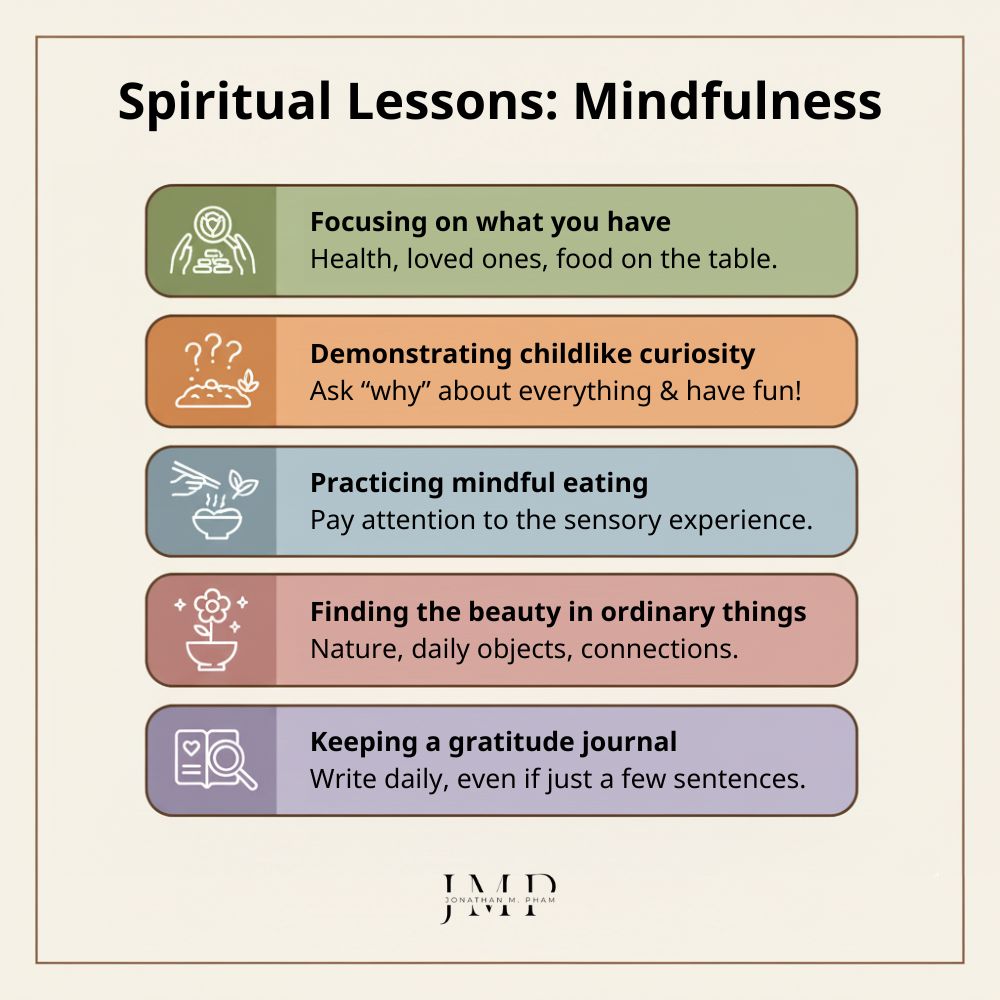
Spiritual Lessons about Family
Appreciating the lessons family dynamics teach us
Family dynamics, with their inherent complexities and diverse personalities, serve as a rich crucible for cultivating patience and understanding. Just as a blacksmith forges iron into a resilient blade, so too does the crucible of family interactions shape our capacity for these virtues.
Think about the patience required when dealing with a sibling’s contrasting temperament or a parent’s differing perspective. These encounters become opportunities to practice forbearance, to hold our tongue when frustration arises, and to extend grace in the face of perceived slight. In these moments, we learn to appreciate the value of a calm response over a reactive one – of fostering an environment of harmony rather than discord.
The family is the first essential cell of human society.
John XXIII
Recognizing that forgiveness within family is essential for healing
Forgiveness, like a gentle balm, has the power to mend even the deepest wounds within a family. It’s a choice, a conscious decision to release resentment, anger, and pain, paving the way for healing and restoration.
Consider a family where a heated argument has led to hurt feelings and strained relationships. By choosing forgiveness, family members can break the cycle of negativity and create space for understanding and compassion. It’s not about condoning the hurtful behavior but about letting go of the bitterness that prevents genuine connection.
Blood is thicker than water.
Proverb
Learning to set boundaries while honoring familial bonds
Setting boundaries within family relationships is a delicate balance between honoring familial bonds and prioritizing personal needs. It’s about finding a healthy equilibrium that allows for both connection and individuality.
For instance, a young adult might need to set boundaries with their parents regarding constant phone calls or unsolicited advice. They could kindly express their need for independence while still valuing their parents’ love and support.
Similarly, a parent might need to set boundaries with a grown child who is overly reliant or demanding. They could communicate their limitations while assuring their continued love and care.
You can’t pour from an empty cup.
Unknown
Understanding that family extends beyond blood ties
The concept of family extends far beyond the confines of blood relations. It’s rooted in the depth of connection, the shared experiences, the mutual support, and the unconditional love that binds individuals together.
Have you ever had a close friend who has always been there for you, offering a listening ear, a shoulder to cry on, and unwavering support? This person, though not related by blood, may feel more like family than some biological relatives. This is the essence of a chosen family, a bond forged through shared values, understanding, and genuine care.
Similarly, a mentor or a spiritual guide can become a significant part of one’s family. They offer guidance, wisdom, and a sense of belonging, fostering a deep connection that transcends physical relationships.
All in all, family is a tapestry woven with threads of love, empathy, and shared experiences. It’s a community of individuals who uplift and inspire each other, celebrating triumphs and comforting in times of sorrow. Whether bound by blood or by heart, the true essence of family lies in the strength of the connections we forge with others.
Here are my mother and my brothers.
Matthew 12:49

Spiritual lessons
Accepting that every family member has their own spiritual journey
Just as flowers bloom at different paces, so too do individuals progress at their own rhythm. Recognizing this diversity is key to fostering understanding and harmony within family relationships.
For instance, one sibling might be deeply spiritual, seeking solace in meditation and prayer, while another might find fulfillment in material pursuits. Rather than imposing one’s beliefs on the other, it’s essential to respect each other’s paths and offer support without judgment.
Accepting the diversity of spiritual journeys is crucial to fostering a sense of unity and love. It allows for open dialogue, mutual respect, and a harmonious environment where everyone can flourish spiritually.
The practice of being on a spiritual path isn’t about being the best meditator or the kindest possible person or the most enlightened. The practice is about surrendering to love as often as possible.
Gabrielle Bernstein
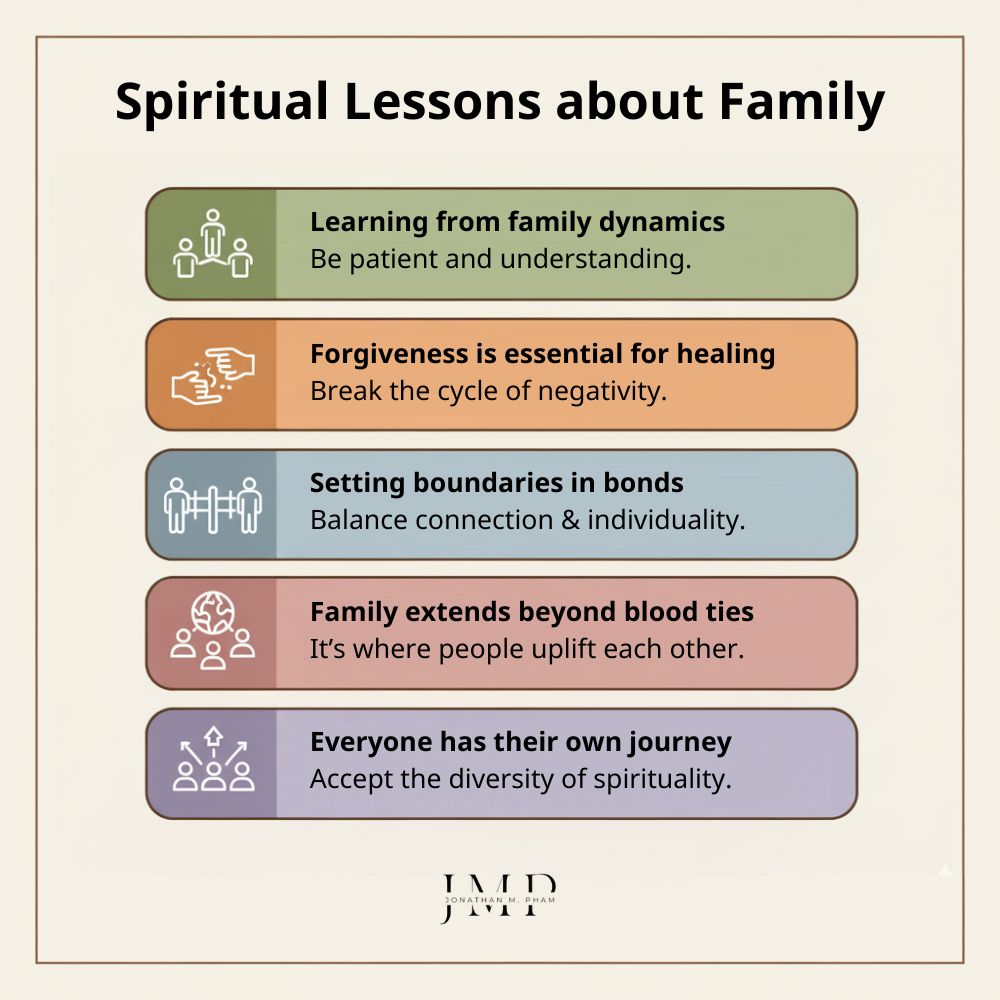
Spiritual Lessons about Friendship & Relationships
Surrounding yourself with people who uplift and inspire
When we surround ourselves with individuals who possess a positive outlook and radiate optimism, their energy is contagious. Their belief in our potential motivates us to push our boundaries and achieve greater things. Having a friend/ mentor who always encourages you to pursue your dreams can provide the extra push you need to take that first step.
During challenging times, having a network of supportive friends and family is often a lifeline. Their empathy, encouragement, and practical assistance is key for us to navigate difficult situations with greater resilience.
Surround yourself with only people who are going to lift you higher.
Oprah Winfrey
Knowing that some friendships are seasonal and meant to teach specific lessons
Every person we encounter, even briefly, offers an opportunity for learning and growth. Some connections may be short-lived but leave a lasting impact, imparting valuable lessons about ourselves and others. For example, a challenging friendship might help us develop resilience and empathy. Hence, regardless of how long a friendship lasts, it’s essential to express gratitude for the time spent together. Cherish the memories, lessons, and love shared, and let go of any resentment or bitterness.
Acknowledging the changing nature of friendships also necessitates the need to let go of them, especially when they no longer serve us. After all, the people we choose to surround ourselves with typically reflect aspects of ourselves. While the process of letting go may seem painful, remember that it’s okay to move on – so that there may be space for new and more fulfilling relationships to emerge.
Some people come into our lives and quickly go. Some stay for a while, leave footprints on our hearts, and we are never, ever the same.
Flavia
Embracing silence
Whether it is enjoying a quiet meal together, taking a walk in nature, or simply sitting side-by-side, simply being in each other’s presence without the pressure of constant conversation is often enough to create a profound sense of connection. While often underestimated, silence encourages deeper listening and creates a safe space for sharing unspoken feelings and vulnerabilities. On the other hand, it is also a sign of trust and comfort within a relationship. Knowing that you can be silent with someone without feeling awkward or judged is a testament to the strength of your bond.
Silence is a source of Great Strength.
Lao Tzu

Spiritual lessons
Being vulnerable
When we share our fears, insecurities, and imperfections with others, we demonstrate that we believe in them enough to be our true selves. This builds trust and inspires people to open up as well – thereby cultivating stronger, more meaningful connections.
What happens when people open their hearts? They get better.
Haruki Murakami
Recognizing that true friendship is about mutual giving and receiving
True friendship is a beautiful dance of give and take, a delicate balance of offering support and receiving it in return. It’s about being there for each other through thick and thin, celebrating joys, and comforting sorrows. A true friend is someone who isn’t afraid to tell you the truth, even if it’s hard to hear. They offer constructive criticism with the intention of helping you grow and improve. In return, you also provide honest feedback to them, helping them to see themselves more clearly.
Being authentic to yourself may sometimes lead to being disliked by others. However, it’s important to remember that not everyone will like you, and that’s perfectly okay. Do not be afraid to say “no” for the sake of your own well-being, and do not hesitate to end a relationship that is consistently draining or harmful.
A friend knows the song in my heart and sings it to me when my memory fails.
Donna Roberts
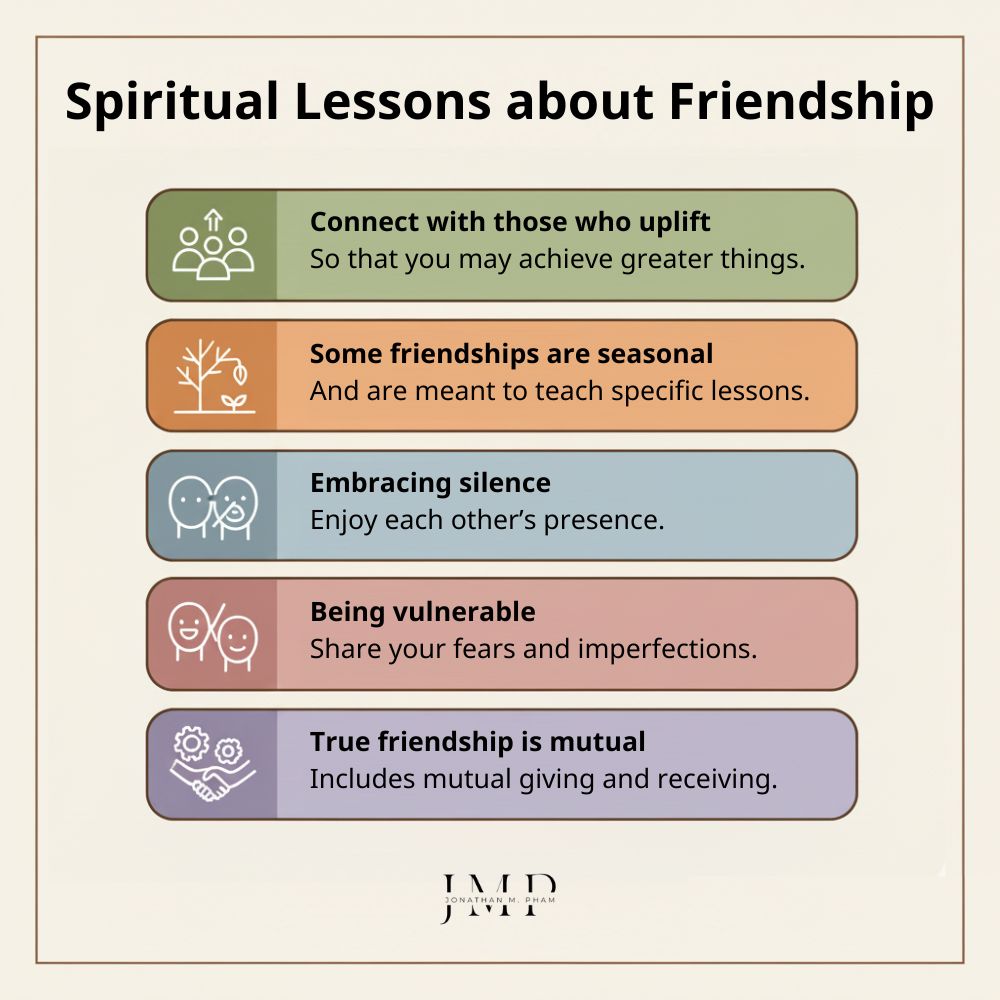
Spiritual Lessons about Life & Death
Accepting the impermanence of life
The Latin phrase “Memento Mori,” which translates to “Remember that you must die,” is a powerful spiritual lesson that encourages us to live life to its fullest. Indeed, all things in life are subject to change. Relationships evolve, jobs change, and physical health fluctuates. Even the most stable aspects of our lives, like our bodies, are constantly undergoing transformation. Nothing lasts forever – material possessions, social status, and physical beauty are fleeting. All that is left is the quality of our experiences and the impact we make on others.
Everything flows and nothing abides; everything gives way and nothing stays fixed.
Heraclitus
Seeing death not as an end, but as a transformation or transition
Many spiritual traditions posit that death is not the end of existence – but a transition to another realm. The soul, considered the essence of a person, is seen as eternal and continuing its journey beyond the physical body. Knowing this should provide comfort to those grieving the loss of loved ones – that their loved ones are still existing in some form. At the same time, it also gives life greater meaning and motivates us to live virtuously, owing to the fact that our actions and choices have consequences beyond this life.
To the well-organized mind, death is but the next great adventure.
J. K. Rowling
Reflecting on your mortality to inspire meaningful living
Recognizing the brevity of life should prompt us to prioritize what truly matters to us. This may involve spending more time with loved ones, pursuing passions, or giving back to the community – rather than wasting energy on trivial pursuits.
Ardently do today what must be done. Who knows? Tomorrow, death comes.
Buddha

Spiritual lessons
Understanding that life is a series of cycles
Life is a continuous cycle of birth, growth, decay, and renewal; hence, clinging to any particular state or experience is futile. After all, we cannot control many aspects of life, including illness, natural disasters, and the actions of others. Therefore, we need to internalize the fact that change is inevitable and often beneficial, even if it is initially painful, and to cultivate a sense of detachment from material possessions, relationships, and outcomes. This principle is not exclusive to any particular religion or belief system; it can be applied by anyone seeking to live a more meaningful life.
The end of one thing is just the beginning of another.
Simone Elkeles
Knowing what defines your legacy
The true measure of a person’s life lies not in material possessions or accomplishments, but in the positive impact they have on others. This impact ripples through generations, influencing future behaviors and attitudes. Rather than chasing material possessions, we should strive for a life of love and kindness – so as to leave behind a lasting legacy that will be remembered long after we are gone.
Respect the Divine and love people. (敬天愛人)
Kazuo Inamori
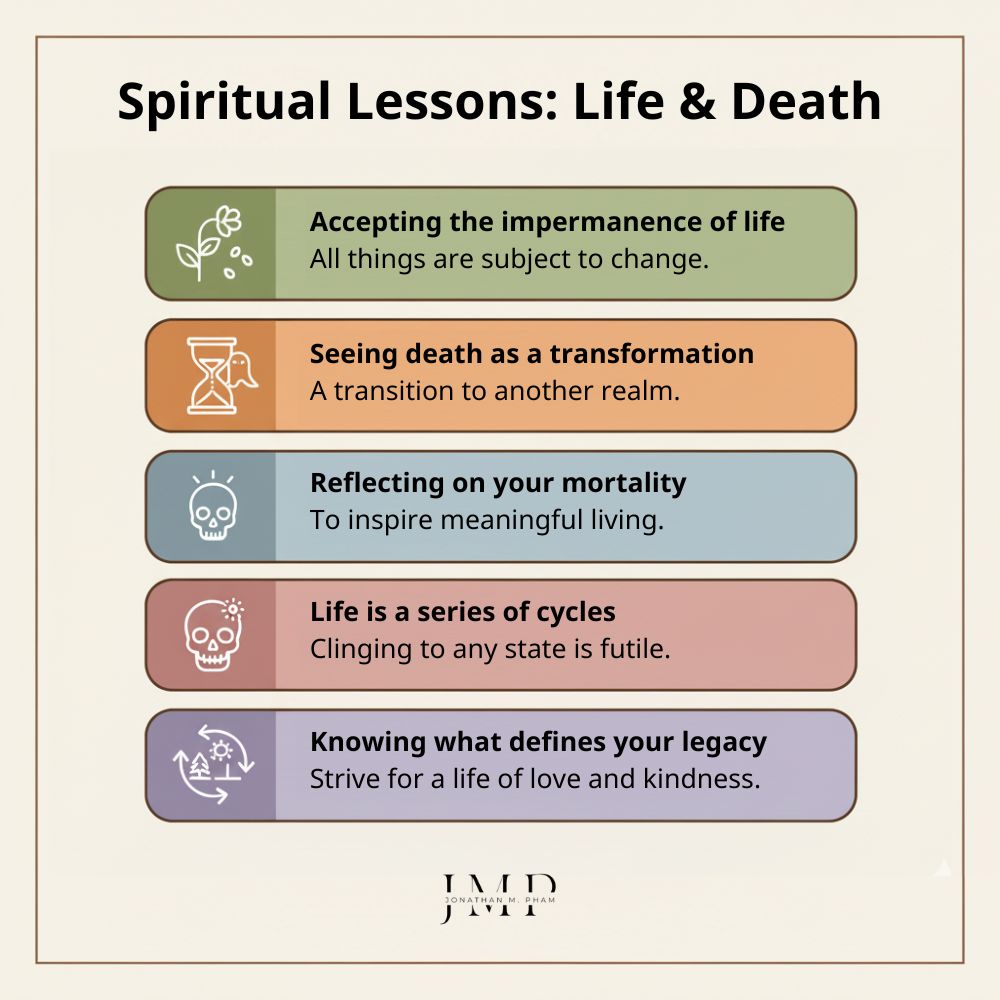
FAQs
Why should I care about spiritual lessons?
Reflecting on spiritual lessons offers a multitude of benefits that can enrich our lives in profound ways:
- Enhanced well-being: Many studies have shown a link between spirituality and improved mental and physical health. Practices like meditation and prayer may aid in reducing stress, anxiety, and depression, while also boosting one’s immune system and overall sense of well-being.
- Deeper meaning and purpose: Spirituality can help you connect with something larger than yourself, giving your life a greater sense of meaning and purpose. This translates to increased motivation, resilience, and a more fulfilling existence.
- Stronger relationships: Spiritual practices often emphasize compassion, forgiveness, and love, which all deepen one’s connections with others. A strong support network provides comfort, encouragement, and a sense of belonging.
- Improved decision-making: Spirituality can help you develop a stronger moral compass and make choices aligned with your values.
- Personal growth: The increase in self-awareness and self-acceptance that stems from spiritual activities often results in increased creativity, problem-solving skills, and overall personal fulfillment.
- Increased resilience: By cultivating a deeper connection to something larger than yourself, one is better equipped to find strength and hope during difficult times.
What is the difference between spirituality and religion?
Spirituality and religion are often intertwined, but they are distinct concepts. Here’s a breakdown of their key differences:
Spirituality
- Individualized: Spirituality involves a personal journey focused on finding meaning and purpose in life.
- Flexible: It doesn’t necessarily require adherence to specific doctrines or rituals.
- Broad: Can encompass a wide range of beliefs and practices, from meditation and yoga to nature connection and artistic expression.
- Inner-focused: Often emphasizes inner peace, self-awareness, and connection with a higher power or the universe.
Religion
- Institutionalized: Religion involves organized systems of beliefs, practices, and rituals.
- Structured: Adherents typically follow specific doctrines and codes of conduct.
- Community-based: Often involves a sense of belonging to a religious community.
- Outer-focused: May emphasize external practices like prayer, worship, and adherence to religious laws.
| Feature | Spirituality | Religion |
| Structure | Flexible and individualized | Structured framework |
| Community | Can be practiced alone or in groups | Involves a sense of community and belonging |
| Beliefs | Open to diverse beliefs | Specific doctrines and dogma |
| Focus | Inner peace and self-awareness | External practices and rituals |
Despite the differences, many people find spirituality within their religion, integrating personal practices with the teachings and community of their faith.
What do spiritual people believe in?
There’s no one-size-fits-all answer to what spiritual people believe in. However, some common themes include:
- Connection to something greater: This could be a higher power, the universe, nature, or a sense of interconnectedness with all beings.
- Inner peace and well-being: Spiritual people often seek ways to cultivate inner peace, happiness, and a sense of fulfillment.
- Personal development: They may focus on practices like meditation, yoga, or journaling to help them grow and evolve as individuals.
- Compassion and service: Many are driven by a desire to help others and make a positive impact on the world.

Spiritual lessons
How to learn spirituality?
Here are some practical tips to incorporate spirituality into your daily life:
- Practice mindfulness: Pay attention to the present moment without judgment. This can be as simple as focusing on your breath or the sensations in your body. Dedicate time each day to quiet your mind and connect with your inner self.
- Connect with nature: Nature is a powerful source of inspiration and healing. Activities like gardening or hiking can help you appreciate the beauty of the natural world.
- Practice gratitude: Write down things you’re grateful for each day, and try to express gratitude to others. A simple “thank you” can go a long way.
- Engage in acts of kindness: Giving back to your community is a rewarding experience.
- Read books and articles: Learn about different philosophies, traditions, and beliefs.
- Join a community: Attend gatherings or workshops to connect with like-minded people and seek guidance from someone who can support your spiritual growth.
Resources that help facilitate the journey:
- Faith & spirituality quotes
- Books
- Films
- Questions for daily reflection
Final Thoughts
And that concludes my list of spiritual lessons, in which we have covered a wide range of topics, from the fundamentals of mindfulness and gratitude to love, loss, and the meaning of life. I hope that by reflecting on them, you will have the chance to gain more clarity in your daily routine and start living a more meaningful, authentic life.
How about you? What are the spiritual lessons you’ve learned so far? Think about the experiences that have shaped your soul, the challenges that have tested your faith, and the joys that have filled your heart. Feel free to share your insights with others – together, we can create a more compassionate and enlightened world!
There are two ways of spreading light: to be the candle or the mirror that reflects it.
Edith Warton
Other resources you may be interested in:
- 20 Japanese Philosophies of Life to Live by Everyday
- Fictional Story About Life: 5 Touching Tales
- 60 Quotes on the Meaning of Life: Wisdom for Life Pilgrims
- 12 Stoic Principles to Live by in the Modern Life
- Are You Living or Just Existing? Let’s Find Out!
Let’s Tread the Path Together, Shall We?


